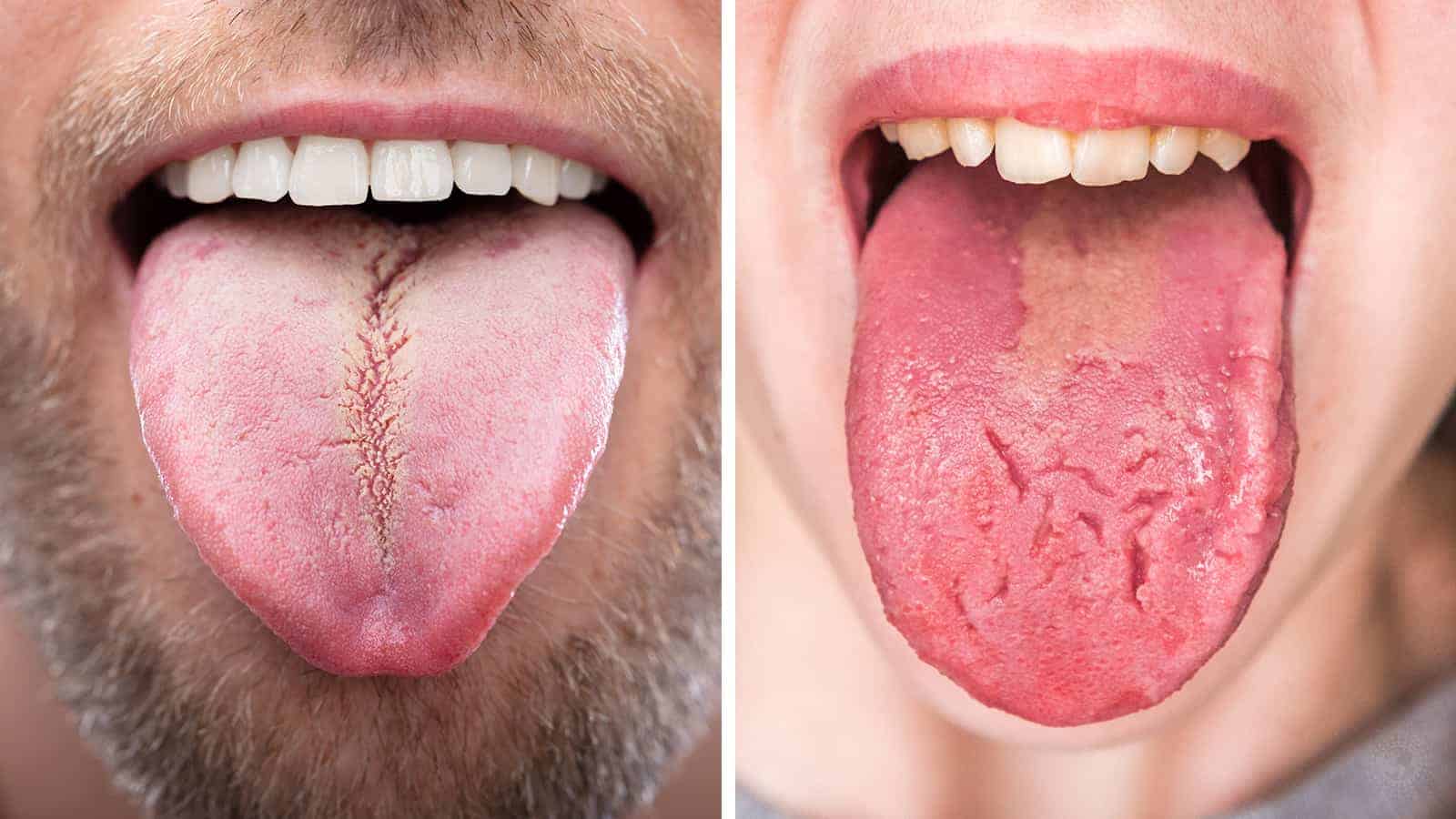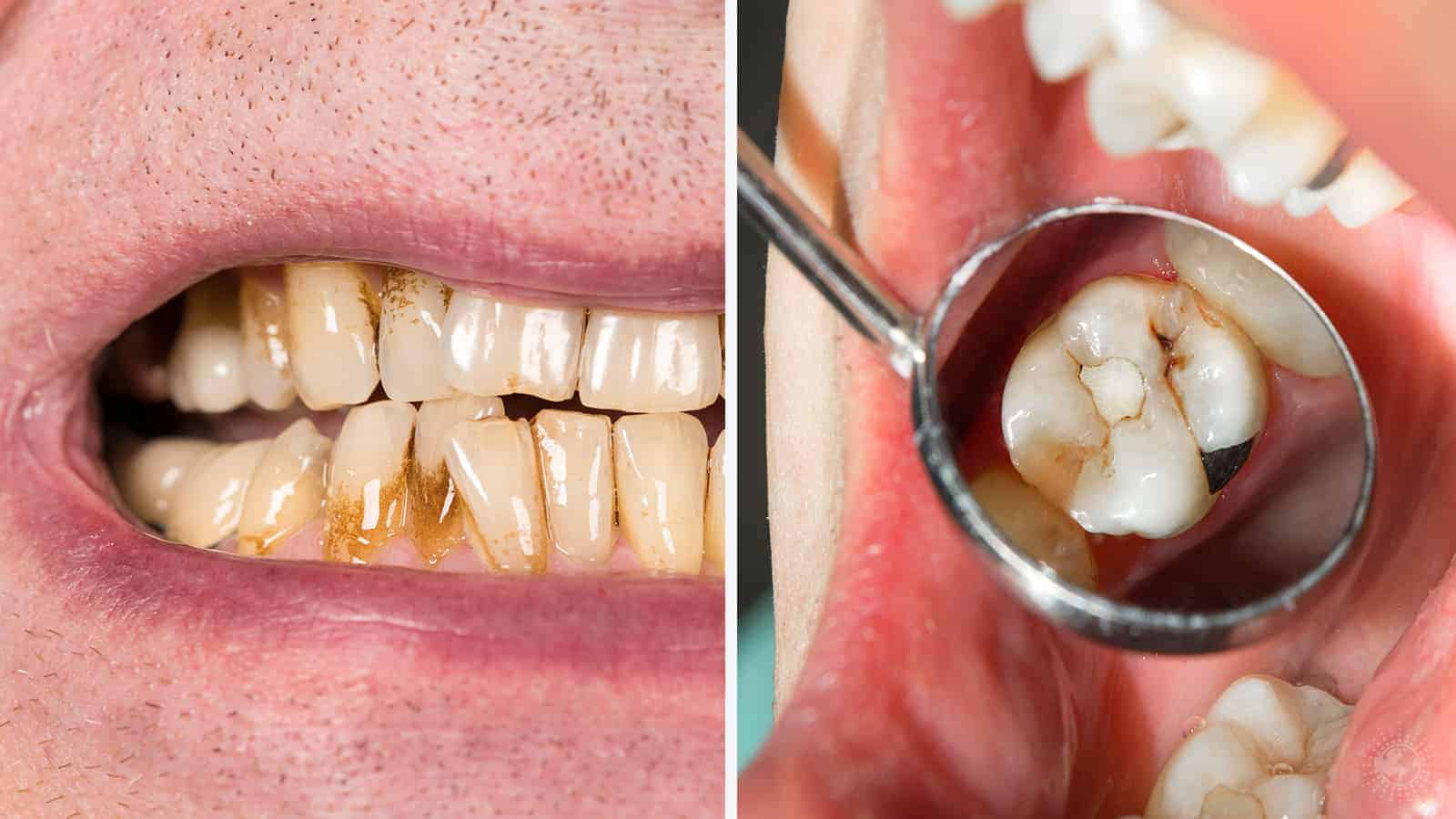The tongue is fantastic! It’s the strongest muscle in a human’s body relative to its size. It lets you taste all your favorite foods. And, on top of all of that, it can tell you things about your health.
That’s right. The appearance, texture, color, and even feel of your tongue can all say something about your current state of wellbeing, so pay attention to it. Here are 11 things your tongue can tell you about your health!
11 Health Issues Your Tongue Might Reveal
Do you see any of these indicators on your tongue?
1. Fuzzy Brown Or Black Spots
Brown or black fuzz on the tongue – whether in spots or the entire appendage – is often a reflection of poor oral hygiene. Often accompanied by bad breath, taste difficulties, and other issues, it’s a surprisingly common problem.Admittedly, it’s quite disturbing to look at your tongue and see this black bumpy hairiness, but it is thankfully not nearly as severe as it seems. You see, the tongue is covered in little bumps known as papillae. When dirt and staining occur over time due to poor oral care, the papillae can become stained, leading to the brown fuzz.
However, not everyone with bad oral hygiene will develop this uncomfortable-looking dark hair. You see, in most cases, papillae are naturally worn down, preventing them from overgrowing. Drinking and eating are more than enough to keep them “trimmed.” But individuals who experience overgrown papillae have a higher chance of harboring harmful bacteria and receiving discoloration over time. This discoloration might come from the following habits:
- Bad dental hygiene
- Smoking
- Drinking dark tea
- Drinking coffee
- To counteract this problem, you can:
- Brush your tongue
- Buy and use a tongue scraper.
- Remove the cause of the problem (such as smoking or dark teas)
2. A Burning Feeling
If you experience a tingling or burning feeling in your mouth, this can point to one of two things. The first, and more common, is that there’s something wrong with the toothpaste you’re using. Allergic reactions to toothpaste are far from uncommon thanks to an ingredient often used in them called sodium lauryl sulfate, aka SLS for short.
SLS is responsible for helping the foaming of toothpaste. An allergic reaction to SLS can occur very suddenly. For example, you may have had no problems with the toothpaste up until a certain point, then been accosted by a burning sensation out of nowhere! Using an SLS-free toothpaste will usually solve the problem, and in the meantime, a dentist can help you with pain management.
However, there is also another potential cause for that burning feeling that is notably less positive: burning mouth syndrome. As described by the American Academy of Oral Medicine, it is the result of hormonal changes that lead to a neuropathic problem. Affecting just 2% of the population, women are seven times likelier to develop burning mouth syndrome than men. This is because menopause is a widespread cause of the issue.
Burning mouth syndrome is a bit of a mystery, and most doctors are stumped as to why it occurs. So far, the following patterns have been detected in patients:
- Continuous, constant burning sensation throughout the day
- Developing burning sensations that start with almost no severity in the morning and worsen as the day progresses
- Intermittent burning sensations, with only some days involving any burning; this is notably less common.
If you believe that you might have burning mouth syndrome, speak to your doctor about treatment. The prognosis is usually good for symptom reduction, so keep your positive thinking!
3. Glossy, Bright Red Color
A tongue that looks strawberry red could be warning you of a deficiency in a vitamin or mineral. This is likely, according to research, to be either iron or vitamin B12. This is because both of these nutrients help the small bumps on your tongue, called papillae, to mature. Without enough of either, this can cause the papillae to disappear.
Symptoms of these deficiencies include:
- Weakness
- Exhaustion
- Memory problems
- Balance difficulties
Your tongue doesn’t have to have turned bright red to lose its papillae, so keep an eye out for any changes. The loss of papillae is especially common in vegetarians or vegans who lack vitamin B12 sources. If you’re one of them, talk to your doctor to discuss possible supplementation.
Some positive sources of vitamin B12 include:
- Beef
- Cheese
- Chicken
- Clams
- Eggs
- Fortified cereals
- Haddock
- Ham
- Liver
- Milk
- Nutritional yeast
- Salmon
- Trout
- Tuna
- Yogurt
Some positive sources of iron include:
- Apricots
- Beef
- Duck
- Eggs
- Lamb
- Leafy green vegetables
- Legumes
- Liver
- Nuts
- Pumpkin seeds
- Salmon
- Sardines
- Sunflower seeds
- Tempeh
- Tofu
- Wholegrain cereals and carbs
4. Sores
Canker sores on the tongue are extremely common. They tend to be very painful for the first five or so days, vanishing or resolving on their own within 14 days. Though there are no currently concrete reasons behind canker sores that experts have uncovered, the American Academy of Oral Medicine and dentists know that:
- Stress can bring about canker sores
- Illness can increase the risk of canker sores
- Canker sores are not contagious
- Canker sores likely have viral causes
Do note that you should know the difference between a canker sore and a cold sore, as cold sores are contagious and are caused by herpes. If you aren’t sure, it’s best to speak to a doctor.
5. “Valleys” And “Hills”
Does your tongue seem to have mountains and valleys all on its own? This landscape is nothing to worry about at all and is, in almost all cases, 100% harmless – so keep your positive thinking!
The American Academy of Oral Medicine refers to this condition as a “geographic tongue.” The name is earned from the appearance of the tongue, which looks like it has uneven terrain. Approximately 1 to 2.5% of the world has this condition.
It’s unclear why a geographic tongue happens, but the consensus among experts is that taste buds are to blame. This is because taste buds can, sometimes, shrink randomly on the tongue. Although taste buds are capable of regeneration, when only some do, and others never return, this uneven, bumpy appearance is created.
6. Thick White Layer Or Lumps
Is your tongue coated with thick lumps that resemble cottage cheese? Unfortunately, this is a prevalent symptom of oral yeast infection such as thrush. Thrush is the result of candida overproduction.
The mouth needs to maintain a delicate balance between yeast and the bacteria that occurs naturally. Certain foods can cause that balance to be disrupted, killing good bacteria while allowing yeast like candida to grow in abundance. This can be caused by:
- A weakened immune system
- Consumption of antibiotics
- Diabetes
- Chemotherapy
If you think you have developed an oral yeast infection, you need to speak to a doctor as soon as possible. Thrush is one of the very few yeast infections that cannot be treated with any over-the-counter items.
7. Small Patches Of White
Small white patches on the tongue are usually a sign of some form of irritation. This can be caused by:
- Smoking (the most common cause)
- Tooth abrasions (when your teeth rub your tongue)
- Injuries, such as overzealous scraping or brushing
These patches are known as leukoplakia and, in many studies, have been precursors to the development of cancer. If you smoke, this is an incredibly severe concern. If you don’t, wait for a week to see if the patches go away, then see a doctor if they don’t budge.
8. White Lines, Webs, Or Stripes
Do you notice white lines along the top of your tongue? This is a classic first symptom of something called oral lichen planus. It can be quite interesting to look at, and some even think that it somewhat resembles lace.
Why does this happen? Generally, it’s believed that oral lichen planus occurs when your immune system attacks the cells on your tongue. This is not contagious but can add to cancer risk. As such, discussing the issue with your doctor is recommended.
Don’t worry too much, though! There is also the chance that the condition will go away on its own. Despite that, it is essential that you receive the correct diagnosis and potential treatment for the situation, just in case. You will likely have to:
- Avoid food that could cause oral irritation.
- Be extra vigilant regarding dental hygiene.
- Steer clear of tobacco products
9. Red Lesions
Red lesions on the tongue are usually quite severe. As long as you’re not mixing these up with canker sores – which are generally not particularly harmful and go away in time – it’s probably a good idea to see a doctor.
Many tongue diseases are marked with lesions like this, ranging from mild but requiring treatment to severe and potentially life-threatening. Oral cancer, HPV, and other similar illnesses have these lesions as a first sign, so even if you’re not clear about what’s going on, it’s a good idea to talk to a dentist.
10. Wrinkles
You probably associate the thought of wrinkles with signs of aging on the skin. What you might not realize is that wrinkles on the tongue are also a common – and harmless – sign of aging! In other words, tongue wrinkles are, on their own, nothing to worry about.
However, the addition of these wrinkles to your tongue does mean you need to be more vigilant about hygiene and cleanliness. This is because the new crevices present on your tongue in the wrinkles are easily prone to infection. They can harbor nasty bacteria because of food debris and other issues, leading to fungal infections. Symptoms of such a disease may include:
- Bad odor
- Pain
- Burning sensations
Have tongue wrinkles despite being younger? Dentures and other similar dental products can lead to tongue indentations that resemble wrinkles. To avoid this, you can:
- Drink sufficient water
- Brush your tongue
- Use a tongue scraper
- Make sure you have a good dentist
- Get dental appliances that fit you properly
11. Yellow Color
A yellow tongue is typically just a sign of bacterial overgrowth and is rarely something to run to a doctor for. You might want to consider brushing your tongue or using a tongue scraper for better hygiene. Some other causes of yellow tongue include:
- Tobacco chewing
- Smoking
- Consuming certain vitamins
- Psoriasis
- Jaundice (very rare)
Final Thoughts On Some Things Your Tongue Can Tell You About Your Health
The tongue really can say a lot about health, and it can also be affected by seemingly minor actions. Maintaining proper oral hygiene and monitoring the state of your tongue is crucial. Remember, if you are concerned about your oral health, you should speak to your doctor or dentist as soon as possible!

















 Community
Community

